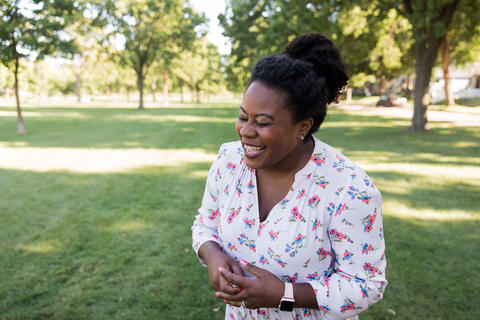
A Voice for Women and Children

How does living in a community that repeatedly experiences racialized police violence affect the reproductive health of black women of child-bearing age? That is the question at the heart of Rachel Hardeman’s current research project, which she is conducting in partnership with North Minneapolis-based Roots Community Birth Center, Broadway Family Medicine Clinic, NorthPoint Health & Wellness Center and UROC.
A health equity researcher and assistant professor in the Division of Health Policy and Management in the School of Public Health, Hardeman has long studied the connection between structural racism and health care disparities. Knowing that the North Minneapolis community already has a disproportionately high rate of adverse birth outcomes, Hardeman hypothesizes that racialized police violence does have a detrimental impact on black women’s reproductive health. And if that proves to be the case, she hopes this research will help pinpoint important new intervention strategies.
“The U.S. is the only industrialized nation with a rising maternal mortality rate, and when you look at this by race you see black women are three to four times more likely to experience illness and death,” Hardeman explains. “I believe we really need to better understand the impact of stress on well-being.” And while the study is currently focused on maternal outcomes, it will ultimately include birth outcomes as well. “African American infants in our community are twice as likely to die in their first year of life compared to white babies,” she continues. “Both statistics represent a startling inequity in our state and the country.”
In addition to examining whether community trauma causes stress during and after pregnancy, Hardeman is also researching whether such trauma influences women’s decisions about having children at all. To find out, she and her team of graduate students have designed a survey that will be sent to women of reproductive age who are connected with Broadway Family Medicine Clinic and NorthPoint.
They will also be conducting focus groups and one-on-one interviews with women who would like to participate at UROC in North Minneapolis over the next few months. “I’m really excited to partner with UROC,” she says. “That will be kind of our home base, which is great because it is a community space that people already feel connected to.”
Though the study’s funding is limited at this point, Hardeman hopes to be able to continue her research, eventually looking at data from across the country as this issue is playing out on a national level as well. “I’d like to have conversations around the country to discuss more broadly how we are experiencing the infant and maternal mortality crisis and think about effective interventions and solutions,” she says. “We need to make sure that folks who are making policy understand what’s going on, so they can make solid decisions to close these gaps and help women and their infants have safe, equitable outcomes.”